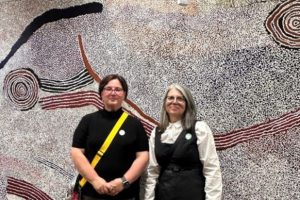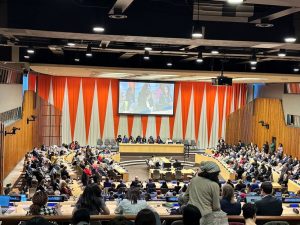United Nations Commission on the Status of Women
Margaret Augerinos and Yvette Jaczina
May 2024

We travelled to New York to attend the 68th session of the United Nations Commission on the Status of Women with the support of the Centre for Non-Violence, our employer, who generously agreed to fund our travel. With CNV’s support and the wonderful offer of UN grounds passes from Community Legal Centres Australia, we were able to maximise the opportunities for learning, influence and networking.
We attended for the full two weeks, and in addition to attending a number of parallel and side events, we were also able to spend some time in formal network meetings around violence against women and take some time out for informal catch-ups with colleagues from around the world.
The theme for CSW68 was “Accelerating the achievement of gender equality and the empowerment of all women and girls by addressing poverty and strengthening institutions and financing with a gender perspective”.
Around 270 side events and more than 760 parallel events were held exploring this theme, working to amplify and elevate, causes, consequences, mitigation and prevention strategies.
Our focus was not only to build further understanding in our core work (gender-based violence/men’s violence) but also gain exposure to critical and new ways of thinking and understanding gender equality at a global systems level. In addition, we were working to develop our understanding of UN instruments and global advocacy.
We attended around 50 events over the course of the two weeks exploring economic gender-based violence, pushing back on patriarchal social norms, intersectional research methods and methodologies, women’s experience in conflict and war zones, women’s leadership in non-violent protest movements and feminist approaches to justice – to name but a few.
Whilst we kept our eyes on the formal negotiations and kept up to date with briefings, it is this aspect of the process we found most challenging. We are in awe of some the long-term advocates from civil society in this space, particularly some of our Australian non-government organisation colleagues who bring significant wisdom, experience and capacity to the global advocacy agenda and who provide such amazing insight into previous agreements and language development over the years.
CSW did result in Agreed Conclusions with commitments to strengthen financing and institutions to eradicate women’s and girls’ poverty.

Ms. Reem Alsalem, current Special Rapporteur on Violence Against Women and Girls, Its Causes and Consequences, was joined by three former Special Rapporteurs in calling for a new Optional Protocol on violence against women and girls to the Convention on the Elimination of All Forms of Discrimination against Women (CEDAW).
Reem Alsalem said, “Speaking of State obligations, has the time come to resurrect plans for an optional protocol to the CEDAW specifically dedicated to ending violence against women? Most of my predecessors and I believe so”.
There has been a long-time call by the Every Woman Treaty campaign for this optional protocol to be developed.
The moment marked the first time the current Special Rapporteur called for a global treaty to end violence against women and girls at a United Nations event, a milestone in the movement for binding international law to protect women and girls.
This campaign represents an opportunity for Australian civil society organisations to engage and advocate around the development of an optional protocol to CEDAW and it would be great to talk further with NGO colleagues on how we can support these advocacy efforts.
We thank Community Legal Centres Australia for the opportunity to attend the formal UN events through sponsoring UN grounds passes for us. We would recommend this experience to anyone wanting to further their understanding of international advocacy and how global instruments can influence not only global change and development, but also their use and influence at a domestic level.